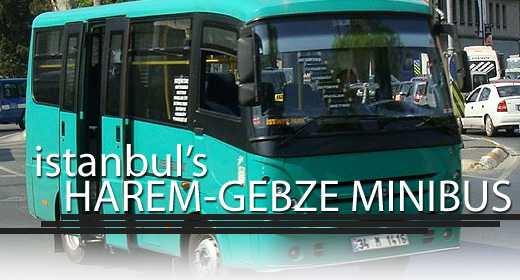One of my favorite activities in Istanbul is mentioned in very few guidebooks: riding the Harem-Gebze minibus.

The Harem-Gebze is a semi-public bus seating about 15 people. I don’t know how many passengers fit in the bus if you include those standing, but during rush hour, drivers seem to always believe there is room for one more.
The buses ply the D-100 highway, a busy road running about a mile inland from the Marmara Sea. One of the Harem-Gebze line’s terminals is in Harem, a major transportation hub on Istanbul’s Asian side, the other in Gebze, an industrial suburb east of the city.
Much of the Harem-Gebze line is now served by a new commuter train, so the minibus activity is certain to dwindle in the years to come. However, the drivers stop wherever the passengers ask them to, so the minibuses can serve local traffic in a way a train never can.
When I tell visitors this bus line is one of my favorite sights in all of Istanbul, residents look at me like I must be joking. Why on earth, they ask, would I recommend a tourist take a bumpy, uncomfortable, erratic, potentially dangerous bus ride through a particularly ugly, crowded, stinking part of the city?
I recommend it because after three days of touring the Aya Sofya, the Blue Mosque, the Grand Bazaar, and maybe Istiklal and Ortakoy, visitors have seen Istanbul as it was, and maybe Istanbul as it likes to relax, but they haven’t seen Istanbul as it is.
In just half a day’s time, the Harem-Gebze minibus will take them past the tall Unilever building standing between the neighborhoods of Icerenkoy and Bostanci, a reminder that one of the world’s largest consumer goods companies uses Istanbul as a center from which to conduct business throughout Central Asia, the Middle East, and Africa.
After Bostanci, the bus passes an infantry training center located right in the middle of the city. The training center is little-used these days, leapfrogged by newer, larger bases further from the city, but it serves as a visible symbol of the military’s prominent, but decaying, role in Turkish political life.
The bus also passes the squat, utilitarian headquarters of Efes Pilsen, a beer manufacturer supplying 85% of the beer consumed in Turkey. From its unassuming offices just off the highway, the company runs an empire that reaches into Central Asia and Eastern Europe. The company even owns breweries in Russia.
Just across the highway from Efes Pilsen is a large satellite office for Turkcell, Turkey’s biggest provider of cell phone and wireless communication services.
From this building the company runs many of its business operations, including almost all of its call center activity and some of its financial planning. Like Efes Pilsen, Turkcell is a major player not only in Turkey but throughout the region, and like Microsoft has in Seattle, Turkcell in Istanbul has spawned startups that bring the company’s technological and marketing prowess to markets throughout Asia, Europe, and northern Africa.
As the bus draws closer to Gebze, it passes the shipyards of Tuzla and the automobile factories of Hyundai/Assan. They are certainly not as huge or as world-renowned as the shipyards and car factories of Korea or Japan, but they are a reminder nonetheless that Turkey maintains significant heavy manufacturing capacity and supplies ships, cars, and trucks to the Middle East, Central Asia, and the Mediterranean.
When the bus makes its last stop in Gebze, there is little to do except have lunch and hop the same bus for the ride back to Istanbul. Gebze, like almost all of the sights passengers can see from the minibus, does not exist for visitors; it exists for residents, the people who work in the breweries and the call centers and the car factories.
In less than one day, tourists will have seen not the Istanbul of museums, mosques, and retail shops but the Istanbul that distributes consumer goods to a billion of the world’s people, the Istanbul that makes ships and cars for Europe, and the Istanbul that helps farmers in Kazakhstan communicate with markets in Poland. They will see Istanbul at work, and that is why this bumpy, smelly, crowded minibus ride tops my list of things to do when you visit the city.
Matt’s new book, “A Tight Wide-Open Space: Finding Love in a Muslim Land” is now available in Paperback and on Amazon Kindle. You can purchase it at his website, . Watch the trailer for the book below.
Book trailer from Matt Krause on Vimeo.
via Istanbul’s Harem-Gebze Minibus | JetSettlers Magazine.
Source :
